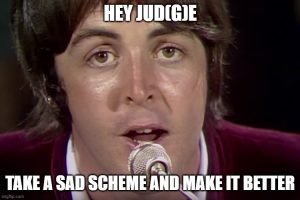The SAD Scheme as an Institutional Failure
[These are my rough-draft talk notes from a recent workshop of trademark law professors.]
The SAD Scheme involves a trademark owner suing dozens/hundreds of defendants using a sealed complaint, getting an ex parte TRO, and then having the online marketplaces freeze the defendants’ accounts and money. The TRO acts like a supernotice compared to the traditional takedown notice: it targets sellers, not individual items; and it implicates their cash from all of their sales, not just the allegedly infringing listings. As a super-notice, it can produce cash payouts from settlements or default judgments (which are enforced against the cash held at the online marketplace, so they have actual value). Even though the TRO is supposed to be temporary, the online marketplaces typically keep the freezes in place longer because of their fear of being liable for recidivist infringers. Mistakes are common in the SAD Scheme, and appeals are almost nonexistent. We consistently see SAD Scheme cases from rightsowners with dubious rights (Emoji, Smiley) and increasingly competitors are using the scheme to sideline their competitors during peak sales seasons.
The SAD Scheme illustrates three essential points about our institutions.
First, the trademark rules on the street can differ widely from the doctrines drawn up in appellate courts. This includes the rules as set by rightsowners in ex parte proceedings, which can deviate widely from standard doctrine–it’s whatever the rightsowners can get the judges to agree to–and the rules set by third-party intermediaries, such as online marketplaces. As another example of the significance of non-appellate law, Google’s trademark policy is the de facto trademark law of online keyword advertising.
Second, the SAD Scheme is swallowing up the rest of trademark law. There are a few thousand non-SAD Scheme trademark cases per year, typically with one defendant or a small number of defendants. If there are 1,000 SAD Scheme cases a year with 200 defendants each, there are 200,000 SAD Scheme trademark defendants in litigation every year. In other words, if we measure activity by number of trademark defendants, the SAD Scheme is approaching 98%+ of trademark enforcements in the US, and it will only grow so long as the scheme keeps working.

I think there’s a great research project here: comparing the rightsowners’ success rates in ex parte proceedings vs. their success rate after the defense gets involved. This error rate is possibly quantifiable, and I think it would rock the world.
While we need to get the doctrine right through appellate advocacy, we also need a way to fix the SAD Scheme’s high-volume mangling of trademark law because it’s the law of the street for the vast majority of trademark defendants today. I need some help with that because the secretive and low-stakes nature of any individual case has made it virtually impossible to intervene; and judges are showing increasing discomfort with the rightsowners’ behaviors but are taking insufficient steps to penalize them or create better precedent.
#StopTheSADScheme
Prior Blog Posts on the SAD Scheme
- Judge Reconsiders SAD Scheme Ruling Against Online Marketplaces–Squishmallows v. Alibaba
- N.D. Cal. Judge Pushes Back on Copyright SAD Scheme Cases–Viral DRM v. YouTube Schedule A Defendants
- A Judge Enumerates a SAD Scheme Plaintiff’s Multiple Abuses, But Still Won’t Award Sanctions–Jiangsu Huari Webbing Leather v. Schedule A Defendants
- Why Online Marketplaces Don’t Do More to Combat the SAD Scheme–Squishmallows v. Alibaba
- SAD Scheme Cases Are Always Troubling–Betty’s Best v. Schedule A Defendants
- Judge Pushes Back on SAD Scheme Sealing Requests
- Roblox Sanctioned for SAD Scheme Abuse–Roblox v. Schedule A Defendants
- Now Available: the Published Version of My SAD Scheme Article
- In a SAD Scheme Case, Court Rejects Injunction Over “Emoji” Trademark
- Schedule A (SAD Scheme) Plaintiff Sanctioned for “Fraud on the Court”–Xped v. Respect the Look
- My Comments to the USPTO About the SAD Scheme and Anticounterfeiting/Antipiracy Efforts
- My New Article on Abusive “Schedule A” IP Lawsuits Will Likely Leave You Angry
- If the Word “Emoji” is a Protectable Trademark, What Happens Next?–Emoji GmbH v. Schedule A Defendants
- My Declaration Identifying Emoji Co. GmbH as a Possible Trademark Troll